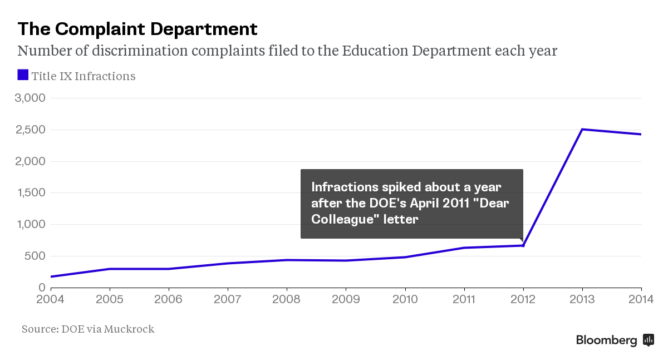For decades, Title IX was the primary driver of change in athletic programs for girls and women across the United States. Part of the Educational Amendments Act of 1972, Title IX prohibits discrimination on the basis of sex in educational institutions that receive federal funding. It underpinned a move to ensure women athletes would have equal access to sports facilities and scholarship funds as well as comparable coaching to their male peers.
But there is far more to Title IX than athletics. Title IX has become the basis for a growing wave of litigation on American campuses. Here’s why.
Title IX: No person in the United States shall, on the basis of sex, be excluded from participation in, be denied the benefits of, or be subjected to discrimination under any education program or activity receiving Federal financial assistance.
SEXUAL HARASSMENT
In a high profile case at Columbia University, Emma Sulkowicz, a current senior, has gained national attention by carrying a mattress around campus to protest her alleged sexual assault two years ago. Her assailant was acquitted, but Sulkowicz carries the mattress in a campaign dubbed, Carry that Weight, to symbolize the “burden” she carries as a result of the alleged assault. Where does Title IX come in? Under Title IX, the University has an obligation to provide equal educational opportunity for women, which is arguably stymied by an environment of sexual harassment or incidences of assault. Sulkowicz’ Carry that Weight protest has spurred a national movement in institutions of higher education throughout the United States as other students come forward accusing schools of inadequate action even when sexual assault or harassment has been reported.
DISCRIMINATION
In an interesting article in Inside Higher Ed, “Going on Offense with Title IX,” the cases of two male students are documented, both filed under the auspices of Title IX. One student from Vassar College and another from Saint Joseph’s University similarly argue that the management of sexual assault charges against them by their respective schools has been mishandled and biased because of their gender. As with other colleges and universities in the United States, the majority of sexual assault allegations are by women against their male peers. The question then becomes whether the preponderance of allegations by women creates an environment that denies men due process either by nature of biased procedures or the investigative process itself.

HOSTILE ENVIRONMENT
Student allegations under Title IX have another consequence for institutions of higher education. If the investigation itself is haphazard in nature and lacks a credible timeline, closure or consequence, students that have made allegations may argue that continuing to attend school is comparable to working in a hostile environment. I write about the importance of closure and timing in workplace investigations in my recent blog, Workplace Investigations: Timing Can Be Everything. As a well-publicized example of hostile environment in March of 2011, sixteen current and previous students filed a Title IX complaint against Yale University. The Yale Herald describes one component of the complaint which alleged that Yale inadequately responded to accusations of sexual harassment and assault, and in so doing, created a hostile environment that precluded women from having an equal opportunity to fulfill their university education.
As our nation’s educational institutions are discovering, students are turning to Title IX in a wide range of legal actions and the potential financial and litigation costs are formidable, not to mention the devastating effect on reputation. Undoubtedly, addressing the causes of the underlying complaints behind the wave of Title IX filings must be the priority. But for any college or university, a robust, documented, standardized process of investigation is more essential than ever before. HR Acuity can help. Contact us or call 888-598-0161 to learn about HR Acuity On-Demand, a versatile, employee relations risk management system that can help mitigate organizational exposure to Title IX.




